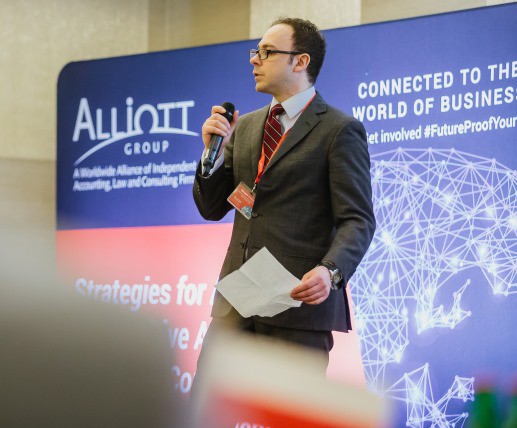Impact of US tax reform on foreign nationals & businesses
07 June 2018
With $1.92 trillion of investment going into the United States from Europe, the impact of US tax reform is an area of huge interest and some confusion among investors from the European region.

At the Alliott Group 2018 EMEA Regional Conference in Prague (9-11 May), US attorney Ted Markson and CPA Scott Shapiro combined across professions to provide more clarity to their European counterparts on the ramifications of US tax law changes for foreign corporations and individuals and also for US expats abroad.
Ted Markson, partner at Golenbock Eiseman Assor Bell & Paskoe in New York City, explained that the big headline story of the U.S. tax reform program (Tax Cuts & Jobs Act) is the reduction in the rate of US corporate tax. According to Markson, historically, corporation tax has been set at 35% with structures being used for international investment into the United States that served to lower the effective corporate tax rate.
“The way affairs were structured would depend on the type of investor and whether, as in the case of a strategic multinational group, there was the benefit of a tax treaty. However, for the typical private equity investor, where a significant portion of the investment is going to a fund in an offshore jurisdiction that that does not for example have treaty protection on the payment of dividends, typically a structure would be deployed that would enable an acquisition or investment to be financed using a mix of debt and equity,” explained Markson.
The first benefit of this would be, according to Markson, to reduce the effective tax rate on the invested capital because the amount of corporate profit could be reduced due to the interest paid on the debt that you had used as finance.
Markson proceeded to explain that the other benefit of this structure was that the investor was able to bring back a fair amount of capital in the form of principal prior to exiting the investment entirely. Alternatively, Markson suggested that if the investor sold the investment and took back the entire capital investment that was created for a non-US investor, that was treated as profits from the sale of the investment and that was not sourced/taxable in the US.
Markson remarked however that dividends would tend to be subject to US tax unless the investor had the benefit of a tax treaty. This type of debt investment structuring would give the investor the ability to bring capital out of the US on an interim basis before disposing of the entire investment. Furthermore, pointed out Markson:
“It had the effect of lowering the corporate tax rate in the U.S. due to the interest payable on the debt.”
Historically, in the US there have been limitations on the deductability of interest, but they were based generally on the extent to which the company was leveraged. Markson outlined that the new law changes this in a couple of ways which impact this current investment structure – firstly, there is the reduction of the official US corporate tax rate from 35% to 21%: “With the new rate being lower, this switches emphasis away from the importance of using the interest to reduce the corporate tax rate and the decision on which corporate vehicle to use. With the rate being 21%, the benefits of investing via specific structures to avoid US corporate tax by distributing profits in a way that will trigger the double tax are less compelling.”
Secondly, while not quite the same as the OECD and EU led base erosion principles, the tax reforms have introduced an outright limitation on the amount of corporate taxable income that can be offset using interest deductions regardless of whether they are paid to related parties and irrespective of the company’s capital structure. Instead, explained Markson, “the limitation means that your net interest expense cannot be more than 30% of your adjusted taxable income.” Markson referred to this as a “conceptual shift in the US corporate tax regime that results in the post tax calculation for the typical debt/finance corporation structure being quite different to how it was in the past.”

US tax attorney Ted Markson a partner at New York law member Golenbock Eiseman Assor Bell & Peskoe.
Flow-through entities (FTEs)
Markson touched on another entirely new concept that hasn’t been fully implemented yet- changes to the way the U.S. treats flow-through taxation, particulary scenarios in which there is an effective reduction in the tax rate applicable to the company earnings of owners of a business (i.e. a flow-through entity) that is taxed on a pass-through basis e.g. a sole proprietorship, partnership, S corporation or LLC.
According to Markson, limitations also apply based on the activities of the business, specifically where:
1) payroll activities of the company are carried out in the United States
2) a fraction of the cap is greater than 50% of the amount paid to employees as wages; or
3) 2.5% of the acquisition cost of depreciable property i.e. the investment is in fixed depreciable assets in the US.
Impact on foreign individuals
For foreign individuals investing into an operating business in the U.S., historically, there has, Markson explained, been tension between the two objectives of minimizing tax and avoiding the need to file a US tax return: “This would complicate planning because a corporation was needed to avoid the return filing obligation and that would result in a second layer of tax. However, because the new law reduces that second layer of tax by 40% (before taking complex planning into account), it reduces the tension between those objectives.”
Key points
In summary, Markson gave his view that we are dealing with a number of moving parts:
“Firstly, we have the change to the rate of tax applied to a corporation doing business in the U.S. Secondly, we are seeing changes to the ability of U.S. corporations to use some of the conventional strategies to reduce or offset their taxable income.”
And while there is a lower tax rate, Markson commented that there are now perhaps fewer options to reduce the taxable income to which that rate is applied. Added to this, the way in which flow-through income from a non-corporate business is taxed in the U.S. is also changing.
In Markson’s view, the combination of these changes is difficult to gauge and somewhat abstract right now. Markson’s firm is starting to look into how the new laws impact particular investments into the United States: “It requires new analyses because some of the structures that would have been routinely advised in the past may no longer be applicable."
Using the example of investment in U.S. real estate, Markson explained that foreign investors would typically have been advised to have a non-U.S. corporation funded using equity and debt but “the right answer now depends on a fairly fact specific analysis that has not been part of the U.S. tax analysis in the past. It is certainly an interesting time for tax practitioners and tax lawyers involved in structuring non-U.S. investment into U.S. businesses and properties!”

Scott Shapiro, partner at Weber Shapiro, Alliott Group member firm in New Jersey, USA.
The Repatriation ‘Toll Tax’
Scott Shapiro, CPA and partner at Weber & Shapiro in Woodcliff Lake, NJ, shared his views on what is being called ‘The Toll Tax’, explaining that the US Treasury Department expects the Toll Tax to repatriate tax on profits back into the US to the tune of some $339 billion over a phased-in period of eight years. Of these tax dollars, it is expected, according to Shapiro, that $40 billion will come from Apple:
“The Toll Tax is a one-time tax calculated at about 15% on profits that have never been distributed to shareholders and that are sitting in bank accounts in various countries. Those subject to the tax can elect to pay 8% of the amount over the first five years, then 15% in year 6, 20% in year 7, with the balance of 25% settled in year 8.”
The Toll Tax, according to Shapiro, makes the tax affairs of US citizens, US expats or those with dual citizenship, particularly complex, especially if they are business owners. Shapiro explained that some US expats e.g. self-employed people who use flow-through businesses, may still be able to be taxed as a US corporation and avail themselves of the phase-in described above, but the rules are, according to Shapiro, still “a bit sketchy.”
While the United States’ Offshore Voluntary Disclosure Program (OVDP), which had been made available to US citizens with money outside the country, has now been closed, Shapiro explained that the IRS’ Streamline Domestic Offshore Program which was set up three and a half years ago and is targeted at those who were “not aware they needed to disclose”, remains open. How much longer it will remain open remains to be seen, but Shapiro commented that he has “a hunch” that they will give six months notice in early July that the programme will be closing at year end. Shapiro also advised that “US citizens working in other countries are required to file US tax returns even if they don’t have a tax liability and they are obligated to file the Foreign Bank Account Report (FBAR).”